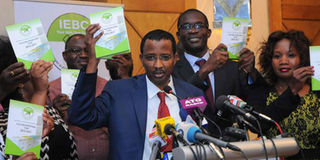The 2017 elections are of their own kind in Africa and merit the cost

Independent Electoral and Boundaries Commission (IEBC) Chairman Issack Hassan launches the Election Operation Plan 2015-2017 at Intercontinental hotel in Nairobi on January 14, 2016. IEBC invite Kenyans to interrogate their Election Operation Plan and the budget it proposes. PHOTO | JAMES EKWAM | NATION MEDIA GROUP
What you need to know:
- We have invested hugely in electoral technology than any other country we know of in the hope of addressing a deficit in social-political trust.
- By sharing our roadmap and publishing our budget, and, more importantly, the detailed plans and resources needed, we gave people a chance to interrogate our processes.
- The number of voters is expected to go up from 14.3 million to 22 million. This will increase the ballots, six for each voter, from 108 million to 130 million.
Following the launch of our Elections Operation Plan (EOP), a detailed document on the activities and resources needed to conduct an efficient and credible poll in 2017, views of an expensive race have emerged.
This is not surprising because most comments on comparative cost of elections hardly factor the critical component of comparative social, political and legal environments in which the elections are being held.
There is no other country in Africa, for example, that has six ballots elections on a single day, as ours.
We have invested hugely in electoral technology than any other country we know of in the hope of addressing a deficit in social-political trust.
As a country, we need to think seriously about the financial ramifications of our electoral culture.
The fact that voter registration and the national ID system are not fused into one multi-purpose identification system means the country has to incur additional costs for almost similar processes.
In France, for example, a driving licence is used as a voter registration card.
By sharing our roadmap and publishing our budget, and, more importantly, the detailed plans and resources needed, we gave people a chance to interrogate our processes.
The claim that our budget is “massive” would not, therefore, surprise us.
NOTHING TO HIDE
What is surprising is the lack of indulgence to say what could be rationalised further without compromising the integrity of the process and outcome.
As it stands, the 2017 elections are the most well-planned polls.
Our budgeting process has been a long rigorous one, characterised by austerity debates among those preparing it.
We are ready to discuss with all stakeholders how we arrived at those figures and the value for money of our decisions.
But it suffices to note some of the factors that make elections expensive in our context.
The Independent Electoral and Boundaries Commission proposes to increase polling stations from 33,000 to 44,000.
Obviously, this had multiplier effects on requirements from transport, polling officials, material, equipment and security.
The number of polling clerks to be employed, for example, will rise from 155,000 to 250,000.
The number of voters is expected to go up from 14.3 million to 22 million. This will increase the ballots, six for each voter, from 108 million to 130 million.
Ballot papers are high security documents and therefore bear some considerable cost.
It is also envisaged that more candidates will contest in 2017, in the various categories of the six elective seats.
We have proposed a revamp of our technology both in results transmission and voter identification to address the challenges experienced in the last General Election.
REDUCING COSTS
These and other measures aimed at strengthening the process and making it more efficient have cost implications.
In addition, the low level of trust on electoral management, caused by real or perceived issues, will always introduce additional measures that bring additional costs.
We print ballot papers abroad because there is lack of trust in local business.
We print currency locally but attempts to print ballot papers in Kenya have been vehemently opposed.
We still have stringent requirement for ballot boxes even though we nowadays count ballots at the polling stations.
The ballot boxes must be rugged and yet transparent. Such conflicting requirements are hard to attain and costly.
The seals political party agents put on the boxes are no longer necessary since the boxes remain under watch by all parties during polling and the counting — both done in the same venue.
If people registered continually over the period between a General Election, fewer registration kits and registration officials would be required.
The registration process would certainly be a lot cheaper and more productive if people came out to register early.
It is worth noting that our budget proposal now spreads over a two-and-a-half year period, unlike the previous one of only a year-and-a-half.
We are alive to the fact that resources are limited. We invite Kenyans to interrogate our Election Operation Plan and the budget it proposes and share their comments with us. It is their budget and their election.
Mr Alawi is an IEBC commissioner





